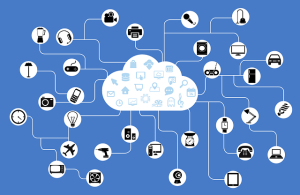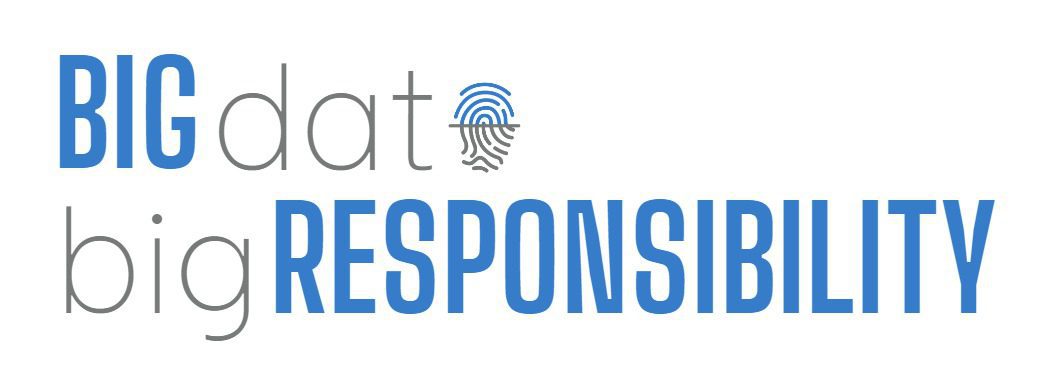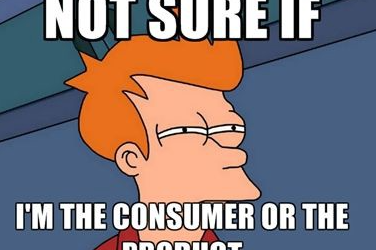Who is in power of the Big Data today? The one who wrote it, the one who used it, the one who accessed, sold it or the one who bought it? The question can easily be taken as a good challenge, especially because there could be as many answers as there are internet users in today’s media sphere.
In the current world of social technology progress, gathering the data through accepting cookies together with the Facebook customized ads that may influence people’s choices has become the norm, in a way, that is often being overlooked. The rights of people as a result have also changed, without many even noticing it. Previously, if you wanted to receive the information you could have simply turned the TV on without the need to accept the “cookies” and provide the basis of your own personal data plus potentially your history choices together with the IP address, but today that is no longer the case.
 You have to “pay”, in a way, every time you access a website and accept the cookies to receive information you are looking for, even if this means, the webpage will not necessarily have the data you were after. In addition you may never know for what purpose your data is going to be used. You can of course read the “cookies terms” but the ultimate purpose would not be revealed to you. Perhaps, your data will be used for the good, for the big positive social justice changes and creation of inclusive sustainable societies and practices, or perhaps not… However, the “Big Data” “is defined in function of what people do with it, with emphasis on human and political agency rather than size. More often than not, grassroots activists and laypersons deal in fact with “good enough data”—that is to say, “citizen data” generated for example through measuring and quantifying practices sufficient to provide “ways of realizing environmental and social justice” (Gabrys et al., 2016: 14) (Beraldo.D.Nov.2019)
You have to “pay”, in a way, every time you access a website and accept the cookies to receive information you are looking for, even if this means, the webpage will not necessarily have the data you were after. In addition you may never know for what purpose your data is going to be used. You can of course read the “cookies terms” but the ultimate purpose would not be revealed to you. Perhaps, your data will be used for the good, for the big positive social justice changes and creation of inclusive sustainable societies and practices, or perhaps not… However, the “Big Data” “is defined in function of what people do with it, with emphasis on human and political agency rather than size. More often than not, grassroots activists and laypersons deal in fact with “good enough data”—that is to say, “citizen data” generated for example through measuring and quantifying practices sufficient to provide “ways of realizing environmental and social justice” (Gabrys et al., 2016: 14) (Beraldo.D.Nov.2019)
There is no return policy in such a case, you cannot “undo” the cookie step and get your data back and have it erased from the “eternal” internet history. This is now forever saved on the unknown data channel and would be looked at by the strangers you never met, who would ultimately know more about you than you ever will about them and well, you would not know who they are anyways, so why does it matter? Or does it matter? Every individual may reply differently, but the question stays: Is there ultimately a choice for people who use the internet and social media to protect its personal data and privacy and navigate safely “without consequences” or is the only way to protect your rights is – to never accept cookies, meaning never opening the internet, browsing the social media and simply chose “a way out” by removing the technology from its life for good? Is it possible or of value in today’s highly tech oriented and fast-paced changing world, where it’s almost impossible to avoid the tech “coming your way” in all sides of life and where, to say the least, paying the bills “manually” may not be an option anymore, rather than doing it via online banking?
Is there ultimately a choice? Perhaps, for someone who chooses to live isolated on an inhabited island alone without internet connection, perhaps then – there is a choice. If that is a choice? It seems like “the numerous and diverse consequences on people’s lives of datafication as a systemic process, such as government surveillance, corporate profiling, algorithmic discrimination and platform capitalism” (Beraldo.D.Nov.2019) has become the norm without every citizen ever voting for or against such a “new” way of living. The world of data seems to have become more similar to a political party’s battlefield rather than a “safe space” to educate the audience and share newest information with them.
The famous quote of the “the Golden Management” (Twitter, 2021) phrased by Entrepreneur, Publisher &, Philanthropist Surendra Tapuriah says:
“When something is free, You are the product”.
 I must admit this is worrying, especially recalling how many times on a daily basis we access the sites that “charge” you nothing in return, or it just seems this way. The word has the power and any power can use the word to gain even more power. The question is, perhaps, if those organizations or individuals do it in the right, ethical and fair way? Another layer of thought opens up a floor to question if ethics are accepted as the one constant norm all over the world or does every individual have its own set of ethics or, so to say, a “moral compass” to follow. You can hear people say: “Well, I hope he does it with good conscious”, but wait a minute, which conscience? His conscience or your conscience? Isn’t it a bit too naïve today to assume that our “good” consciousness is the same for every human in every part of this ever changing world? The basis of morality is probably the same and has kept its usual set of terms arisen from the back in time when it was first created, but the assumption that every individual or company in power would treat it in the same origin way is to perhaps expect too much.
I must admit this is worrying, especially recalling how many times on a daily basis we access the sites that “charge” you nothing in return, or it just seems this way. The word has the power and any power can use the word to gain even more power. The question is, perhaps, if those organizations or individuals do it in the right, ethical and fair way? Another layer of thought opens up a floor to question if ethics are accepted as the one constant norm all over the world or does every individual have its own set of ethics or, so to say, a “moral compass” to follow. You can hear people say: “Well, I hope he does it with good conscious”, but wait a minute, which conscience? His conscience or your conscience? Isn’t it a bit too naïve today to assume that our “good” consciousness is the same for every human in every part of this ever changing world? The basis of morality is probably the same and has kept its usual set of terms arisen from the back in time when it was first created, but the assumption that every individual or company in power would treat it in the same origin way is to perhaps expect too much.
The Cambridge Analytica scenario.
The sadly famous case of The Cambridge Analytica–Facebook scandal that led to overall question and concern in the world of datafication over the “methods deployed by Cambridge Analytica to target voters through psychographic profiling algorithms, built upon Facebook user data” (Hu.M.Aug.2020) is a good example of how much power can big tech companies as Facebook have in today’s society over its users, and not just a few thousands but over a multi billion audience in all parts of the world. In Frank Pasquale’s seminal work, The Black Box Society: The Secret Algorithms That Control Money and Information (Pasquale, 2015), published in 2015, “Pasquale observes that algorithms have shifted the gravitational centering of power in modern society” where: “Deconstructing the black boxes of Big Data isn’t easy,” however: “[i]t matters because authority is increasingly expressed algorithmically. (Pasquale, 2015: 6–8). (Hu.M.Aug.2020)
Interestingly enough such an audience that is using Facebook and similar sites on a daily basis build up a sort of its own society in another social media reality where there is no policy, government or equal rights that are defined by objective individuals outside of the zone of the influence that they are a part of and who do not hold their own personal or political agenda to influence the viewers or restrict the content as they please. Today, in every country there is a government, a constitution, a set of norms and rules that citizens shall abide by. There is not really such a “governance” in the big tech world. “Governance can be defined as “the manner in which power is exercised in the management of a country’s economic and social resources for development” (WB 1992:3). In almost all countries, “a significant set of the powers of governance are entrusted to the government” (Heeks, R. 2017) that takes decisions, executes policies, makes laws and is considered a recognized authority over a particular population.
Perhaps a question to explore is if there ever be an organization as such to govern the media territory objectively? The governance that could coordinate the contents, cookies, rights and opportunities to access to the data and sources equally across all big tech companies and global population. Where there also would be a responsibility and accountability to the messaging that is being fed into the global world. Does it then mean that viewers and readers shall not work on themselves and self-educate and simply rely on the corporations and media content that they receive daily to be the truest source of reality? Of course not. The question of being self-educated on the matters of life, economics, politics, geopolitics, environment, communication for development, sustainability and others themes is up to each individual but there needs to be a common ground and effort from both sides to facilitate an equally “safe space” and truest form of data distribution that is both fully available for the users to see and to avoid, if they wished to.
References:
Twitter, Surendra Tapuria (2021, November 22) https://twitter.com/bobbycal/status/1462681737566179331?lang=en
CloudPrompt (2016, April 27). Datafication – An Era of Big Data. https://www.promptcloud.com/blog/datafication-era-of-big-data/
Beraldo,D. & Milan,S. (2019, November 7). From data politics to the contentious politics of data. https://journals.sagepub.com/doi/full/10.1177/2053951719885967
Hu, M. (2020, August 24) Cambridge Analytica’s black box. https://journals.sagepub.com/doi/full/10.1177/2053951720938091
Heeks, R. 2017. Information and Communication Technology for Development (ICT4D) Abingdon: Routledge. https://ebookcentral.proquest.com/lib/malmo/reader.action?docID=4912767
Image credit: https://www.promptcloud.com/blog/datafication-era-of-big-data/ https://medium.com/@manishapankey/user-empathy-in-data-centric-products-17c7998b756


